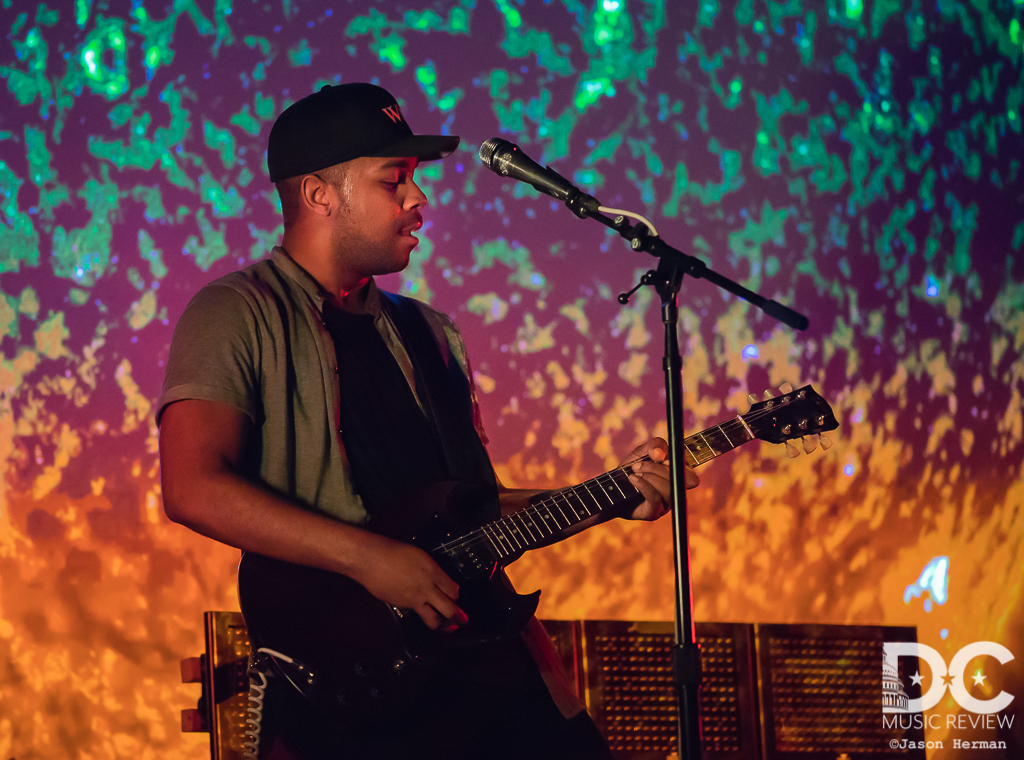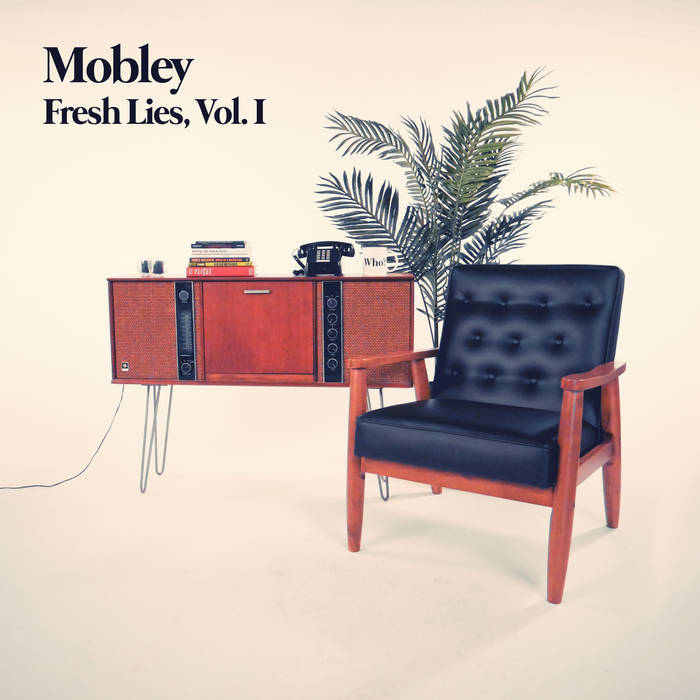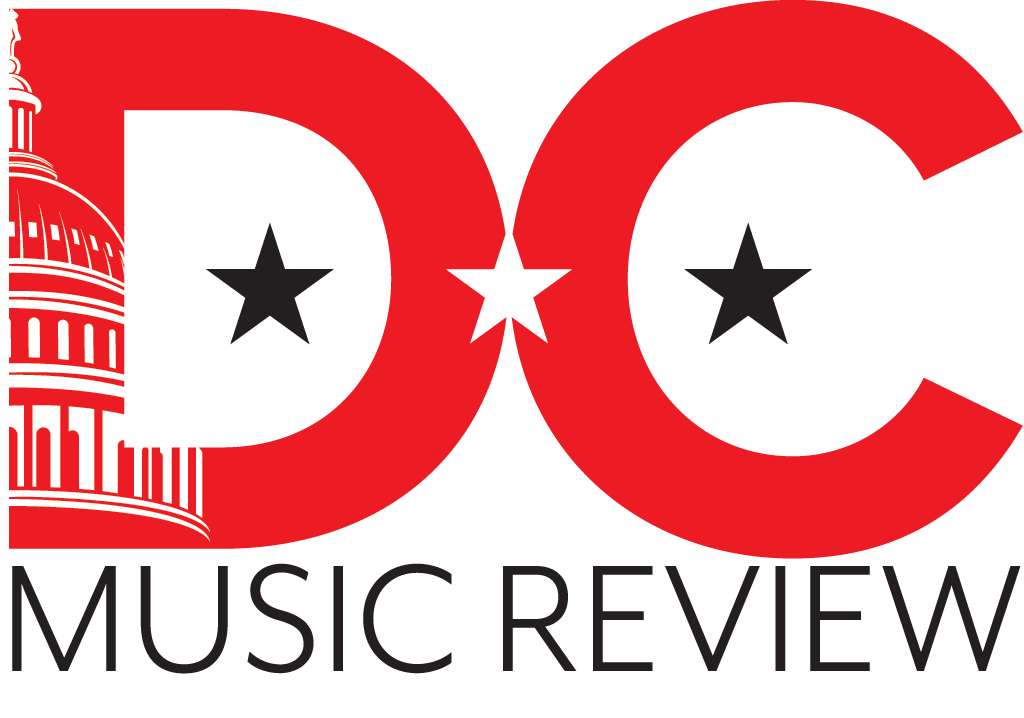We had the opportunity to sit down with Mobley before his performance at the City Winery DC on May 4th.
Karin McLaughlin: So we’re sitting down with Mobley at the brand new venue over in Ivy City. Congrats on being the first to break in the green room and one of the first artists to be able to perform here, that’s pretty cool. After listening to your new album, it’s hard to say that you would fit into just one specific musical category. We’re going to make one up.
Mobley: OK
KM: Let’s say we’re doing a Grammy presentation and you’re the model of the category – what would the category be called?
M: Post-genre pop
KM: Who else do you think would fit in the category?
M: Nobody, that kind of defeats the purpose, doesn’t it?
KM: No one. Well then you would automatically win, right? I also read that you do pretty much everything yourself, you’re a very DIY type of guy. When you are putting an album together – writing it, recording it, editing it, doing the videos for it – how is it to be able to have a hand in every aspect and has it always been that way with you? Did you start in one thing and then say, “Well I want to be able to do that for myself too”?

Mobley's background in film provides some stunning backdrops to his performance.
M: Yeah, I’m gonna answer things in reverse order. It did not start that way. I went to school to study film. So I have some training in that and then, basically everything else has been self-taught. The way that that usually goes is that I have an idea and I want to get it done and I’m frustrated with the process of trying to convey an idea and end up teaching myself how to do the thing. In terms of how it is, it’s a lot. There are times that I wish it weren’t so entirely that way. I don’t know, I think there’s also kind of a unique integrity of vision that can emerge from all of that, for whatever that’s worth. Just knowing and people knowing that if they’re watching a video or listening to a song, that literally every decision of what they’re hearing and seeing went through me and a lot of it is just me, by myself, doing whatever the thing is.
KM: What’s your favorite aspect, what's your favorite thing to do in the process?
M: Uh, it kind of depends on my mood. I write and produce at the same time. Because I record myself, I don’t really do demos anymore – I’ll just start working on a song and work on it until it’s done and then I’ll put it out. So that kind of hybrid writing-production process is probably my favorite aspect of it. You don’t have to – even though I’m the only person on stage at my show – you still need a lot of other people to have a show. You need a lot of other people to do a video. I don’t really need anybody else to make a song, so I can do that anytime I want and have that. There’s no delay to that gratification the way that there is when it comes to releasing new music or playing shows or putting out videos or basically every other part of it. It’s just an instant, innocent high there.
KM: How does it go in that world of – do you get other people’s feedback or are you your own worst critic and just keep going back and re-listening and saying ‘No, I don’t want it like this, I want it like this’?
M: I don’t really get other people’s feedback directly but something that does happen, I’ve noticed this ever since I first started writing songs, and I think probably a lot of artists are like this – I have the people that are in my life at any particular moment and they kind of form an imaginary audience. So, I might write a lyric and then think ‘oh so-and-so is gonna laugh when they hear this’. Or I might come up with a shot or a chord and think ‘Oh yeah, this person is really gonna like that or this person isn’t really gonna like that’ so I’ll have to kind of ignore them (laughs). You know what I mean? So people are definitely having an influence on it, whether or not they’re having a direct say on it.

KM: Fresh Lies is super-duper fresh, how long did it take for that album to come together?
M: Technically, it’s not an album, technically, it’s volume 1 of a song cycle.
KM: Ahhh, ok – how long did volume 1 take to come together?
M: A long time (laughs). So I actually recorded two albums in the pursuit of that one and then threw them away because it wasn’t what I was looking for. So, that process probably started in 2013. And I’ve put out lots of music since then but in terms of landing on the thing that I ended up putting out last week, yeah, it’s been, I’ve been wrestling with that project since late 2013.
KM: And you’re right out, ready to get on the road and do everything.
M: Yeah.
KM: Hard-working man. Of course this is kind of a standard question but who, growing up, were you listening to, who were your musical influences or even now, who do you find yourself singing along with and enjoy listening to?
M: So growing up, I didn’t really listen to a lot of secular music. The first album that I knew all the words to was New Moonshine by James Taylor. Middle school I started listening to some Motown stuff but lots and lots of Gospel and contemporary Christian music when I was growing up. And then, when I was 19, I listened to a Beetles album for the first time and I probably listened to the Beetles for a year and a half after that. Then I had my Radiohead phase and the predictable stuff just like everybody else. Lately though, it’s kind of all over the shop - I really like Bruno Mars last record and Rhianna’s last record and then just lots of indie stuff – bands that I’ve worked with or played shows with, stuff like that.
KM: You were also a big hit at South by (South by Southwest Music Festival) 2 years ago. You do festivals and then you do stuff like this where it’s a good size crowd but a lot more intimate – what’s your favorite type of crowd to play for or favorite setting?
M: My favorite setting is dark, narrow, standing. I like completely dark rooms. I like shotgun rooms where the walls are like pretty close on each side so that if you don’t want to be part of the show, you kind of have to leave. Um, and then everybody who is up front and then just behind them are in it. I really like when people are standing, I vastly prefer that. So, we’ll see how it goes tonight (laughs). I hate tables.
KM: Well, you’ll just have to make everybody stand up then. You control the crowd, right (laughs)?
M: We’ll see.
KM: What’s something that you haven’t done yet that is on your musical bucket list, a collaboration or venue? Or something that’s gonna be the next thing you check off?
M: I don’t have a list - maybe I should, if only for situations like these. I don’t know, my disposition has always been, or at least my adult life, has been to avoid forming very sophisticated expectations about anything. Morale is really important for an independent musician and when you form expectations that are too elaborate, you inevitably end up getting let down and that can really kill morale. So I’m just, I don’t have very may expectations and I’m constantly, pleasantly surprised so I don’t have a great answer for that but I’m sure something’s going to happen in the next 6 months and I’ll be like ‘Oh if I had known this was going to happen, that’s what I would’ve said’.
KM: Ok, well I’ll get back to you on that one then. What’s the song off the new volume that you are most excited to play live in front of people? And see – either for yourself, just because you’re going to enjoy it the most or to see peoples reaction to it?
M: Um, so I’ve been playing a lot of it live but I guess the one that I haven’t – I’ve played it live one time – because I was able to get a bunch of musicians I’ve worked with over the years together - I had like 15 people on stage with me at this festival. I haven’t figured out yet how I’m going to do it as a one-man-band – I think it’s going to involve a lot of vocal looping and stuff – that’s it’s just going to take me a while to figure out how to work it into the set, but the last song on the record, it’s called ‘Native Son’ and it’s going to be really hard to play. The rhythms that are going on in the guitar don’t fit exactly with the rhythms, they’re kind of rhythmic, with the vocal melody rhythms and then there are just a lot of different instruments going on and a lot of different vocal areas at the end so I’m kind of excited about the challenge of figuring out how to pull that off live and then seeing whether or not people agree that I’ve pulled it off.
KM: I feel like, with as many talents as you have, you could probably pull almost anything off onstage.
M: I hope you’re right.
KM: Do you know much about D.C and the D.C. Music scene?
M: I don’t know very much about the music scene. My parents live in Fredericksburg and I used to live in Quantico so I’ve spent a lot of time around here. I mean, D.C has a legendary music scene obviously but no, I haven’t been informed about it too much.
KM: I was just curious, just being where we are, with the go-go scene and this neighborhood especially changing so much.
M: Yeah, it seems like it.
DCMR: Now because you write and do all the instruments, how does that make you feel about all the people that have come before you – especially, like Prince who could play all of his own instruments but he had a band. You have Elliott Smith who also wrote and played everything but would take a touring band. Even Trent Reznor of Nine Inch Nails – and then you go ‘Wait, I’m doing it all’. How does it make you feel and what is your feeling about those musicians who came before you and going down that road and what you’ve done and accomplished and having that retrospective and going ‘Man, these guys really worked hard!’ Or ‘Man, I wish I could blame the drummer for messing up that tune!’
M: Yeah, I imagine that I’ll eventually put together some type of band, if only to occasionally do stuff. There’s a fun and dynamism and excitement that comes from playing with other players that you just can’t replicate by yourself. But in terms of – I mean I love all those guys. I definitely don’t feel like I should be mentioned in the same breath as those guys, but definitely the fact that they did it lead me to be like ‘Alright well, maybe I can do it, why not?’ As far as the records, I’ve been doing it relatively solo on the records for a long time now and that didn’t feel so until people pointed it out but in terms of the shows – I’ve only been doing it like this at shows for about a year-and-a-half and yeah, it’s just been kind of incredible. People’s reactions to it immediately were – it was different – I’ve been touring for years and the reactions to the exact same songs, it was nothing I’d ever seen before, so hopefully I’m kind of breaking a new ground. I think I’m doing the one man thing in a little bit of a different way than most people are doing it.
Related Articles
Related Articles
Related Articles
Related Albums:

To purchase Fresh Lies, Vol. 1 by Mobley, please make sure to visit Mobley's Bandcamp page.
